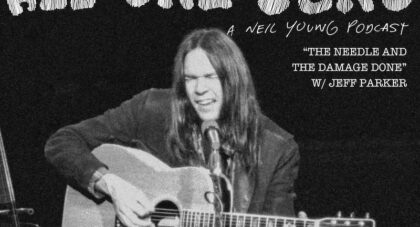“Oh, please tell me you academics, how do you wake up from a non-dream?” That impossible question is one of many loosed by Cass McCombs on his latest album, Mangy Love. It appears about half way through opening track, “Bum, Bum, Bum,” a nuanced lament about institutionalized and violent racism, built on a smoldering, descending melodic line. Mangy Love sports a new sound for Cass. His roots-inflected poem-songs have mutated into a snakey hybrid of slow jam soul music, half-Dead guitar psychedelia, and zig-zag no-no wave. All of this with a fuzzy, glow of aural nostalgia. It’s different but the same–the soul of his poetry is as clear and beautiful as it has ever been, minus the endearing sprawl of his past few deposits of work. “You think you’ve heard it all before/ well, here’s once more/we’re all at war/bum bum bum.” I think Cass considers himself a “craftsman” rather than an “artist” or “activist,” striving to attain an egoless practice but unable to tune-out that ear that’s to the ground. A difficult, contradictory endeavor, but he only ever gets better at it. “If it’s so easy, you try… here, you try” he sings from “Medusa’s Outhouse.”
That said, attempting to discuss, praise, parse, or “review” work by Cass feels futile and perverted… like lining up with the hapless, helpless “academics.” All head and no heart. Instead, it’s feels more appropriate to think of Mangy Love as an ancient redwood forest, and a spin of the record as a sort of walking meditation, an attempt to listen and to harmonize with the environment.
Chatter around Cass tends to focus on how he’s mysterious and oblique, a monosyllabic interview, and always-wearing sunglasses. It seems like biographical details follow him around like lost dogs looking for their owner (mange is caused by parasitic mites and afflicts the skin, the surface organ, of man’s furry friend). This is a guy who–in a particularly laudatory profile for The Washington Post–expressed a desire to see all of his records destroyed and that “biography has nothing to do with craft.” Back in 2011, when Cass–bless him–was conducting press via mail, he remarked “the greatest art of any era comes from anonymous sources.” These are provocative claims, but they reveal an artist who wants to melt away into his craft, to assimilate into folk consciousness as opposed to self-consciousness. But we live on an Earth dominated by a capitalistic hegemony. There’s contradiction here: Mangy Love is out now on ANTI- Records; it’s reified art. The inherent sin that sticks to our bones in this “rancid world” until we let go of them and float on up to heaven. “No rhetoric and no gold for bards” he sings on “Cry.” So let’s relieve ourselves of any attention to Cass McCombs the man and focus on the poetry, the sound, and how the two journey together through whatever folk-consciousness our stained brains can muster. Is that a cigarette butt I see in that redwood tree? Is it still burning?
In the spirit of disrupting commodity and to help find points in the forest on which to focus, let’s break down the boundaries of “album” and “song” and allow Mangy Love to bleed into records of the past. Peer at the unseen roots below the tree. Cass has said “Rancid Girl” is a love song, “Opposite House” is about mental illness, and “It” is about seeing a UFO; but we’re trying to forget Cass. Collaged, associative listening may bring about “Brighter” illuminations for these songs, the “Way” to the “Why?” So at this point turn up the volume.
Only the good shit. Aquarium Drunkard is powered by its patrons. Keep the servers humming and help us continue doing it by pledging your support.
To continue reading, become a member or log in.


